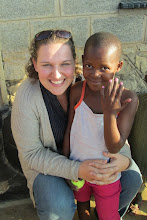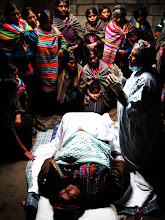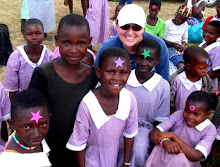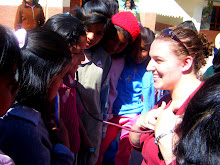As we waited in line with our bags outside the taxi, everyone seemed resigned to the non-optional search, and Basotho willingly presented their bags. Without even the pretence of asking permission, they began digging around in people's bags, tossing them aside haphazardly after their search. As an American, this invasion of privacy immediately struck me as uncalled for and illegal. I stood to the side, quietly evaluating the situation, and pointedly avoiding the obvious line Basotho had made to have their bags searched. I had no intention of submitting to an unwarranted search of my luggage without a good reason. As it turned out, however, I had no need to worry... I'd almost forgotten. I'm white.
As I watched the Bastho passengers submit to the unlawful search, one of the officers sidled up beside me. "What's your name?" he asked, with a little too pointed interest. After a few minutes of answering his questions with patience, despite the unraveling situation in front of us, he leaned over and said, "Can you believe these Basotho? They're so stupid." I was immediately affronted. As I turned to him, I switched over to Sesotho in a pointed act of solidarity. "Ke lula Lesotho, Ntate, le batho ba mo." I said, harshly. "Ke ruta bana ka Lesotho. Hape ke tseba Basotho ba bohlale haholo... Ha u tsebe Basotho, Ntate." I said, moving away from him. Shock and surprise washed over his face, at my defense of "these people." Had I been almost any other white person in South Africa, he would have likely found me a willing ally... Ready to lambaste Basotho and rail on about their stupidity and incompetence. He couldn't have known that he'd stumbled upon the only 5 white people in all of South Africa who live with, work beside, and truly care for Basotho. He immediately realized he'd made a huge error in judgement about us.
Yet these two particular police officers seemed to enjoy the attention, and proceeded to press the issue.... Making an obnoxious show about saying that they had the right to search any Mosotho they wanted to, with or without permission. It was the definition of a power trip. We eventually boarded the taxi again, ready to get back on the road and leave these two pompous officers and their prejudices behind. As we settled in, however, we noticed that a young woman from the front of the taxi, and a little boy and his older brother, who had sat beside me in the back, were still standing outside. The officers were yelling at them in Sesotho, and even without any knowledge of the language, I could have told you something was wrong. As the minutes dragged on, and the three passengers outside pleaded with the officers for leniency, the woman next to me leaned over. "The man and woman don't have a valid passport on them, and the officers are saying they have to arrest them," she said with a regretful shake of her head. "Is that legal, 'Me?" I asked, confused at what seemed like a fairly severe punishment for a minor infraction "Technically they are supposed to have a passport if they are Basotho citizens, but the young man says that he and his little brother are actually South African citizens who live in Ficksburg and he doesn't have a passport." As I listened carefully to the yelling and pleading outside, I caught that the young man who had been sitting beside me was taking his little brother home to their mother, who lives outside Johanneburg. They were coming from their grandmother's house in Ficksburg, near the Lesotho border.
When the officer heard this excuse, he laughed meanly. "They are Basotho!" he railed on. "Of course they are Basotho... Look here." He said, roughly jerking the little boy towards the window near my seat in the back. I watched as he pulled the boys left arm up, and slid up his shirt sleeve. He searched the skin on the inside of his fore-arm for something I couldn't see. "Aha!" he said. "See! Basotho!" He shouted triumphantly. I looked towards the place where he pointed and saw a small scar. It made a tiny, almost unnoticeable bump on the inside of the boy's arm. The 'Me beside me leaned over again upon seeing my confused look. "All babies born in Lesotho are marked on the inside of their left forearm." "Why?!" I said with a little more force than I'd intended. "So that people will know they are Basotho." My jaw almost dropped in shock, as I turned to look at my friend, Amanda, who also had a look of horror plastered on her face. We both thought it immediately... "It's ethnic branding." I whispered to her, appalled at this new knowledge. The tiny mark on every Basotho's forearm was used to distinguish them from other peoples in southern Africa. It was a tool of discrimination. And we were witnessing it firsthand.
After a few minutes, the Basotho on the taxi started pleading with the officers. "Please, bo-Ntate... Pease forgive them. They will get passports. They won't do it again. Please have mercy." The officer approached the door to the khombi, glancing into the back of the taxi with a leer. "What do you think I should do?" he said directly to us, with a smirk that said he was enjoying this show of power a little too much. "We think you should have a little compassion, Ntate," Amanda said gently. "These people have said that they wouldn't do it again, and this boy needs his brother to take him to his mother." "I don't care what these people say!" the officer laughed mockingly. "They broke the law and I can arrest them all, if I want!" he said, gesturing to the entire van full of Basotho. "I understand you may have cause to take the woman and young man, but the little boy has a valid passport," Amanda's husband, Will, chipped in. "Surely you wouldn't arrest him when he's done nothing wrong."
This conversation went around in circles for the next ten minutes. Eventually, the officers put the three Basotho into their police van, including the little boy who had not broken the law. "Ntate, don't do this... Have a little compassion." the Basotho and we pleaded. "At least give us the little boy to take to his mother in Johannesburg," I said. "My friends and I will take responsibility for getting him to his mother." Everyone understood that, false charges or not, the expense of traveling to some police outpost 5 hours from Johannesburg and paying the bribe to have the boys released could easily break a poor family financially. The officers completely ignored the pleas of the Basotho, but we knew that as white people we held some sway in this situation. They clearly loved the attention, especially from Amanda and I, the only two white women on the khombi. And neither of us were ready to walk away from this situation without a fight, when we knew we had the potential to make a difference.
So we adamantly argued that the police release the boy to us. Eventually, after playing to their egos, they agreed to release the boy from custody. As he settled back into his seat next to me, tears streamed down his face. I gave him a gentle pat, "It's going to be okay. Let's call your mother in Joburg and tell her." I said. This only upset him more, and Amanda took the opportunity to make one last push in defense of the young man and woman still in handcuffs. "Have a little sympathy, Ntate. This poor child is scared without his brother, and it may be that his story is true and he IS a legal South Africa citizen." we argued. "What will you give me for my kindness?" the man said with a sneer. "Nothing, Ntate." I responded angrily. "We won't give you anything... But it's the kind thing to do. These people have done nothing to you, and yet you have terrified this boy and threatened them all. We're done, Ntate." I said, closing the window beside me firmly and turning away from him to face the front.
At this clear signal from us that this 45 minute negotiation was over, he suddenly and unexpectedly gave in. "Fine... I'll release them this once, but ONLY to show you what a generous person I am," he said, directly to Amanda and I. I swallowed my disgust. "Thank you, Ntate. We appreciate your compassion." We turned around determined to end the conversation.
When the young man and woman finally got back on the taxi, they both looked shaken. The little boy immediately grabbed his brother's hand, as he took a seat beside him. The poor boy continued to sob uncontrollably for the next five minutes, as his brother whispered assurances that everything was okay now.
As we finally pulled back out onto the road and left the two police officers behind, I was also slightly shsken to realize that I'd just defied and argued with the South African police. It was an action that was ENTIRELY uncharacteristic for me. But as we all agreed while discussing it afterwards, these were specific circumstances... There was safety in numbers for us, and an added influence as white Americans in a country where race is still a very present issue. We had pushed our luck this time, and it worked out. But when Basotho turned to thank us, we assured them that we never would have argued with an authority figure like that in America. At the end of the day, I felt good about standing up for Basotho. I knew that we had been on the right side of the moral line. It made me sad to think that black South Africans, who just decades ago were treated horrendously by whites, would treat Basotho with a similar disdain. The horror of Basotho being ethnically branded and discriminated against stayed with me for several days afterwards.... When I thought about it, I pictured the little bump on the forearms of all my kids. A mark that was put there without their consent, just minutes after birth. A mark that might one day be used to justify their poor treatment or humiliation. Now when I hear the word discrimination, I'll think of that day on the taxi... Of the injustice that some people endure, for no other reason than their place of birth.
With Love from Lesotho... Mary E.






No comments:
Post a Comment